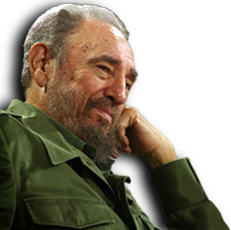Cuba pays tribute to Fidel Castro Ruz on the seventh anniversary of his passing
Cuba pays tribute this Saturday to the historic leader of the Revolution, Fidel Castro Ruz (1926-2016), with multiple tributes dedicated to evoke his legacy, on the seventh anniversary of his passing.
Photographic exhibitions, talks, book presentations and public events held during these weeks, demonstrate the living presence in the people of the architect and main guide of the process of transformations that has driven the country for more than six decades.
Cultural institutions also joined the tributes to the historic leader with the panel "Hart's Vision of Fidel", organized by the Office of the Cuban Martí Program.
The dialogue was led by prestigious intellectuals such as the director of Casa de las Americas, Abel Prieto; the director of the Martiano Program Office, Eduardo Torres Cuevas, and writers and researchers Pedro Pablo Rodriguez and Eloisa Carrera, widow of Armando Hart.
As a way of evoking Fidel, the panelists spoke about Hart's work and thought and his unconditional loyalty to revolutionary and fidelist principles.
This Saturday a political and cultural evening will take place on the steps of the University of Havana, where the young lawyer consolidated his Marti and revolutionary formation.
As founder of the first socialist state in the western hemisphere, the historical Cuban leader designed, guided and executed a foreign policy of clear independence and global extension, and an internationalist teaching.
In addition, he promoted on a worldwide scale the Third World's battle against the current world economic order, in particular the foreign debt, the squandering of resources for military expenditures and neoliberal globalization.
It advocated a policy of solidarity among the oppressed and respect for sovereignty within the Non-Aligned Movement (NAM), an organization of which Cuba was a founder in 1961.
His role in the consolidation of the revolutionary process, the economic and social transformations of the country, the development of education, health, sports, culture and science, the confrontation of U.S. aggressions and the call for unity in the region made him a universal symbol of resistance.







